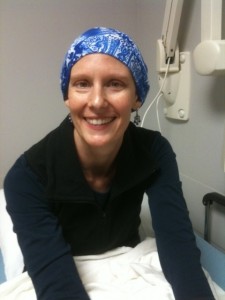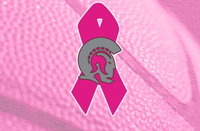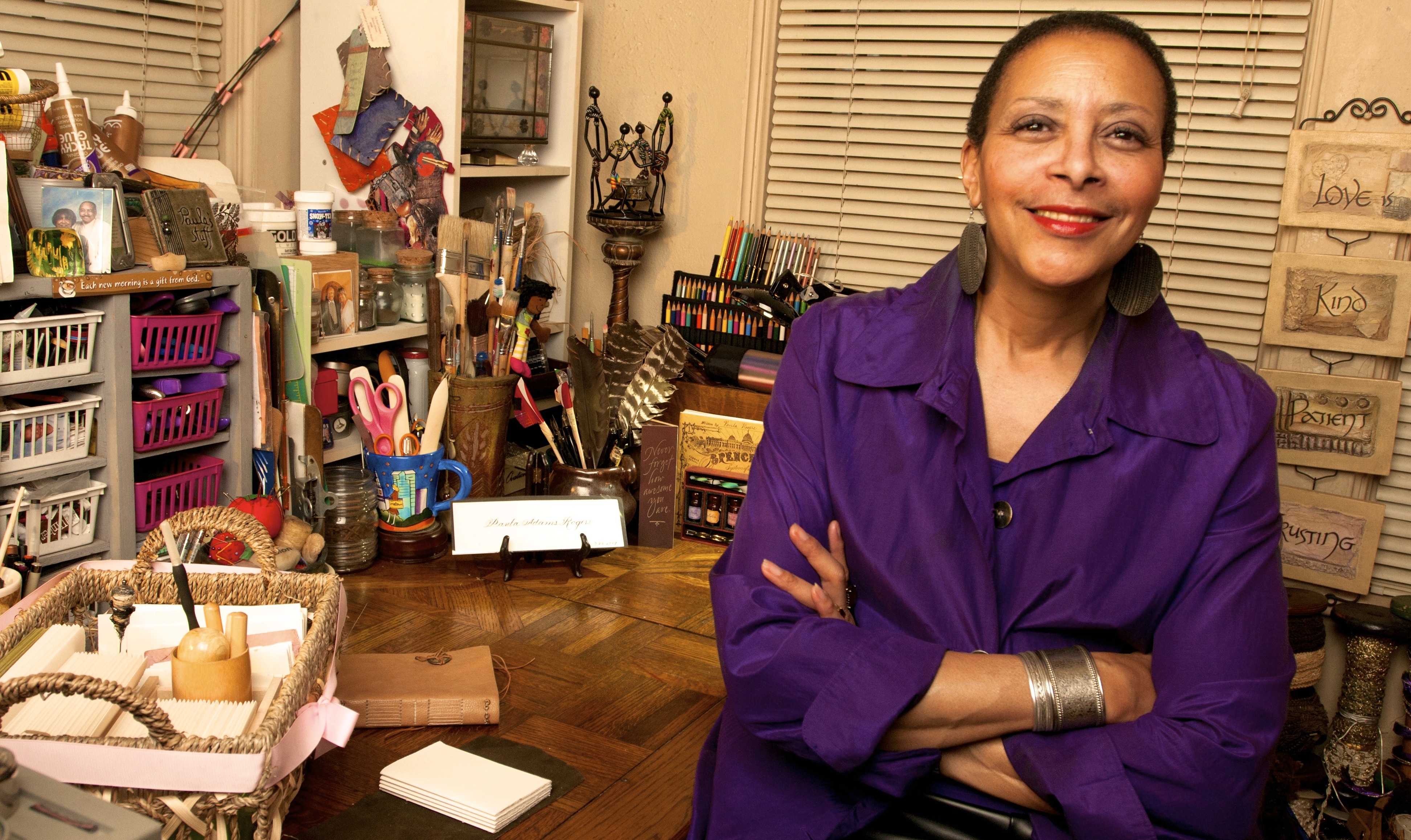Celebrate Pink Game Night with survivors
According to the American Cancer Society, nearly 40,000 women in the U.S. who battled breast cancer were expected to die from it in 2013, the latest year for which statistics are available. Only lung cancer outpaces its fatality rates among women.
But for every unfortunate loss of life, there are many stories of survival, sometimes in spite of great odds; among them are our colleagues at UALR. They will be honored Saturday, Feb. 14, during the annual Pink Game Night at Jack Stephens Center.
They inspire us as women warriors who fought the good fight and never gave up.
Breast cancer can strike at any age
History Professor Kristin Mann’s story
Dr. Kristin Mann, a professor of history at UALR, was not yet 40 when she discovered a lump in her left breast in May 2011.
Mann immediately saw her primary care physician and received a color ultrasound to confirm the presence of a mass and a week later had a core biopsy procedure.

Unfortunately, the hardness of the mass caused the needle to glance off the tumor, so the sample was drawn from surrounding, non-malignant breast tissue, initially misleading doctors into believing Mann’s condition was not serious.
The mass continued to enlarge as Mann led a Summer Institute for teachers at UALR. By the time she was seen by a breast surgeon in June 2011, it was clear a lumpectomy should be performed immediately to rule out anything life threatening.
“I didn’t expect anything different,” Mann said. “My husband and I were just shocked to hear the news that it was cancer.”
Compounding the shock was the fact that Mann had lost her dad to kidney cancer almost exactly nine years earlier and her mother-in-law had died of breast cancer less than seven years before.
The biopsy results indicated Mann had a rare and particularly aggressive form of the disease known as metaplastic triple negative. The prognosis is generally not as good compared to other types of breast cancer, but it does improve if the patient makes it to certain stages of recovery.
With two young children, a husband, a mother, and many friends, Mann resolved to do whatever it took to fight back and improve her chances of survival. She began chemotherapy in July 2011.
“I went every two weeks until the end of October. I had long blonde hair at the time, so losing it was a very emotional experience. But once I got over the initial shock, it was OK,” she said.
Meanwhile, Mann returned to teaching in August 2011, scheduling Tuesday and Thursday courses so she could receive chemo on Friday and have the long weekend to recoup.
Her colleagues in the history department helped out, some offering to teach a class period to lighten the load while others brought her family food and drove her to treatments. She also found support through church friends and parents she knew through her boys’ school.
“They were amazing,” she said. “And my students were so great and understanding. It’s amazing how going through this process helped me connect with students with family who’ve had cancer.”
In December 2011, Mann underwent a double mastectomy and was able to start back to work in January 2012. In May 2012, after a semester of follow-up treatments, she received permanent breast implants. Through it all, Mann said work helped keep her sane.
“I knew I had to keep teaching, otherwise you wind up sitting in your house, waiting to get better or get worse,” she said. “Normal routines are the most comforting things.”
Three years out since her diagnosis, Mann has hit a milestone. Her health crisis, while not a welcome disruptor, has helped her focus on the things that matter most.
“We have to keep things in perspective, to take things as they come up and deal with the next thing,” she said. “For today, I will stay in today.”
She adds, “Anytime you have a change in symptoms you have to keep a lid on this feeling of dread–and then you do your yoga breath and say to yourself, ‘I can only control what I can control.’”
Dealing with recurrence
UALR Health Services Retiree Bobbi Pitts’ story
Until her retirement seven years ago, Bobbi Pitts was a familiar and friendly face in the UALR Health Services for more than three decades.
Generations of Trojan athletes knew her by name because Pitts was responsible for their annual physicals. Even now, she and her husband are regular supporters of the Trojan teams at the Jack Stephens Center.
As a 13-year breast cancer survivor, Pitts was certain the worst was behind her. But in August 2014, a lump was found in a muscle under her arm. She hoped for the best, thinking maybe it was a cyst. It wasn’t.
“That was the scariest time for me because I thought, if it has been lurking in my body it must have spread all over,” she said.
Pitts finished another round of chemo and radiation this past Christmas, but it didn’t impede her ability to  show her support for the Trojans.
show her support for the Trojans.
“I am feeling great and have only missed one game all year,” she said.
During the recent 80s theme night this February, she even wore the 1980s-era, maroon-and-gold jersey she used to wear when she delivered first aid for the fans back then.
“Everything looks good now. I’m getting my energy back, and my hair is growing back, so I’m doing very well,” she said.
Pitts was first diagnosed with breast cancer and received a mastectomy on Oct. 31, 2001.
“I was scared at first because my mother had died of breast cancer. But I had a lot of confidence in the physicians and the hospital and in the treatment,” she said. “I knew much had changed since my mother had died.”
UALR’s Health Services was a lot smaller in those days, and Pitts was adamant about minimizing the number of sick days she used. Like Mann, she would receive treatment on Friday so she could have the weekend to regroup before returning to work Monday.
“I wore a wig and barely missed any work,” she said. “I just did not want to be sick, so I was really hard on myself, and I often felt really tired. I guess I thought ‘I really didn’t want to be sick,’ so I decided to act like I wasn’t sick.”
And, the fact was, Pitts loved her job. Even in retirement, she stays connected to UALR by coming out to help deliver flu shots.
Pitts was relieved to realize the recurrence of cancer was localized, and it had not apparently spread. She was also relieved to be retired. At almost 71, she needed all the strength she could muster to fight back and accept more treatment.
The first time she had cancer, she took a pill specific for the kind of cancer she was diagnosed with. But the pills were so expensive, she decided to discontinue them.
“And it probably was all right, because my second cancer seems to have changed from the first one. It had mutated, but even though it was different, the doctors are treating it like a recurrence,” she said.
“I feel so fortunate that things with treatment have gone well so far,” Pitts concluded. “I appreciate all the support I have gotten from family, friends, and colleagues.”
What cancer can teach us
UALR Children International Education Manager Paula Rogers’ story
Paula Rogers, a 20-year veteran creator of after-school and summer programs for at-risk children, seemed destined to a life of giving.
As an education manager with UALR Children International, she oversees programs for hundreds of kindergarten through 12th-grade students in the Little Rock School District. But after two bouts of breast cancer, first in 2008 and again in 2011, Rogers has learned the precious gift of accepting support from others.
“Cancer taught me the true meaning of love,” she said. “I received prayers and cards from all over the world. They were a source of strength and comfort during my treatment.”
 Rogers’ daughter, a senior at UALR, along with close friends provided encouragement and strength, too.
Rogers’ daughter, a senior at UALR, along with close friends provided encouragement and strength, too.
“My daughter was there with me every step of the journey. She came to all my appointments and took exceptional care of me,” said Rogers.
When Rogers was first diagnosed with Stage 3 breast cancer in 2008, she was the first patient at the UAMS Winthrop P. Rockefeller Cancer Institute to undergo breast reconstruction immediately following a bilateral mastectomy.
“I know everyone isn’t eligible to have two surgeries at the same time, so I’m very grateful,” Rogers said.
Rogers’ health rebounded following the surgery. Then, three years later, she made a disturbing discovery. An unusual lump revealed itself to be a second tumor, and it was found in the same location as the first had been.
In 2011, Rogers underwent chemo, surgery, and radiation for eight months, but she never lost hope of full recovery.
Indeed, as one of 10 honorees from around the nation to receive the prestigious 2014 Lewis Hine Award–and only the second Arkansan to earn the award–Rogers was able to make the all-expense paid trip to the awards ceremony last February in New York City.
The National Child Labor Committee presents the annual award to those who have given a lifetime of unheralded and exceptional service to young people. It is named for the acclaimed NCLC photographer who documented the exploitation of children in the early 20th century.
Rogers works, lives and plays in the University District near UALR and is a proud member of the University District Development Corporation Board. She first volunteered and then later accepted a job with UALR Children International to cultivate after-school programming. She also partnered with UALR to create a community garden that is still thriving after 19 years.
Over the last 13 years, utilizing her expertise in art education and her interest in social justice, she has created numerous programs and activities that have left a lasting impression on Little Rock youth.
One of the schools participating in the Kids’ Club program was hailed as most improved in Arkansas. Kids’ Club delivers arts and literacy programming at four area elementary schools.
In addition, Rogers was behind the creation of Mind Your Own Business, an entrepreneurship and service summer camp in which more than 1,300 kids have participated, and the Empty Bowls service-learning project, to encourage children to participate in combatting childhood hunger.
Through it all, Rogers says her faith and the support and love of friends and family has carried her further than she ever imagined. Rather than beat her down, cancer has taught Rogers a few invaluable lessons.
“Since my first diagnosis, I’ve seen my son go to college (and is now in the Navy). I have two grandchildren, 15 and 4. These are grateful moments,” she said.
“I want people diagnosed with cancer to realize it is not a death sentence. Cancer helped me rethink life–how to live better, how to love greater, and how to give more.”